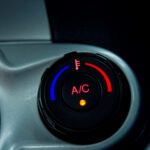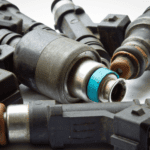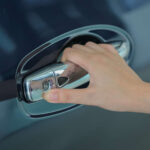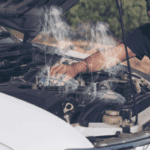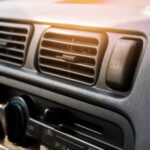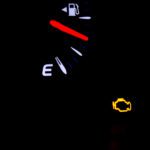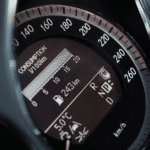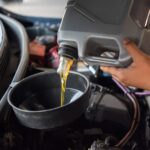A few drops of oil under the car in the morning can be concerning, but it may not be a cause for immediate worry. This article provides all the information on which part may be the culprit if your car leaks oil when parked for a few minutes or overnight.
A car leaking oil when parked is usually a slow leak that can be traced to the oil pan or valve cover gasket. There are a few other places where oil can leak when parked, but they aren’t so common. Needless to say, I’ve included them in this article.
What Does It Mean When Your Car Is Leaking Oil but Only When Parked?
If your car leaks oil but only when parked, it could mean a problem with your engine’s gasket or seals. When your vehicle is parked, the oil can accumulate and leak from these areas. When the engine runs, the oil constantly moves, removing the pressure from one weak gasket. This makes leaks from these areas less noticeable. Oil leaks are extremely common across all engines, and it’s not uncommon to discover a leak when the car is put up on a ramp for inspection, even if the owner was unaware of it.
Is It Definitely Oil Leaking?
Fluids that have leaked on the floor will all be a dark-looking puddle, so you need to be certain without presuming it is the engine oil. Motor oil has a similar feel and consistency to brake and power steering fluid, so it can be challenging to identify which fluid is leaking. However, it will all appear as dark brown puddles once on the ground. So, it is worth first checking the levels are correct on the:
If the fluid levels are low, you can then check the relevant components for evidence of leaks.
Possible Causes of Leaking Oil When Parked
The below causes of the oil leaking don’t necessarily mean that the car has to be parked for it to leak oil or any other fluid for that matter; it may not be noticeable until you park when the puddle gathers under the car. The most common reason will likely be a gasket, but that doesn’t mean you shouldn’t be aware of the other reason indicated below.
Leaking gasket or seal
There will be a gasket anywhere in the motor there are two different parts to seal together. The main places for oil leaking are the valve cover (top) or the motor’s sump cover (bottom).
The valve cover gaskets tend to leak when the engine is running, but the oil can take a while to drip down the side of the motor, so it’s not uncommon to see a small puddle on the floor when parked.
The oil sump holds the motor oil when the engine is off. A failed gasket will cause a constant leak, and a bigger puddle will form when the vehicle is parked for some time. When a sump gasket leaks, it can quickly lead to a low oil level, triggering the low oil level warning light on the dashboard.
Other gaskets or seals that can cause oil leaks are:
- Crankshaft seal
- Camshaft seal
- Timing cover gasket
These additional seals and gaskets do not typically leak only when the car is parked and may not appear as slow leaks.
Damaged oil pan
The oil pan goes by many names, such as crankcase, sump, oil pan, etc. The sump is exposed, so it is easily damaged over speed humps or an impact from debris. Hairline cracks around the damage are common after an impact, and the oil drips constantly.
Before replacing the oil pan, you need to be sure it’s more than just the gasket that needs replacing; as we highlighted earlier, these are common for failing. Replacing the oil pan is relatively easy; however, some applications require removing components, such as oil lines and the exhaust, making it time-consuming. You must replace the oil pan gasket with a new one or use a liquid gasket sealant when replacing the oil sump.
Oil drain plug loose
The sump plugs should have a copper sealing washer around the plug; occasionally, people forget to replace these with new ones or fail to return them after an oil change. This can induce leaks from around the plug. A leak from the sump plug won’t necessarily happen immediately after an oil change, and it could take up to 6 months to appear.
Unless the thread of the crankcase is damaged from over-tightening the drain plug, replacing it’s a simple fix that may require a new bolt, but usually just a new copper washer and the replacement oil after draining it again.
Split oil lines
There are oil lines that carry oil to multiple different components around the engine. These may be constructed of metal or rubber; the oil lines to look for damage on are:
- Motor to and from the turbo
- Motor to and from the oil cooler
- Motor to and from an externally mounted oil filter (where applicable)
Any one of these oil lines can split and leak, usually with age, especially the rubber lines, which crack and deteriorate. The metal lines only break from an impact, so they are pretty solid. It is prudent to check the actual component the oil lines go to for any sign of oil leaks. Some of the smaller rubber oil lines are simple to replace, but the large metal oil lines that run around the engine compartment can be a real pain.
Loose or damaged oil filter
Oil filter leaks usually happen straight after it’s been changed. The leaks happen if the area where the filter seats on the engine aren’t cleaned properly or if the new filter rubber seal is dry and tears when the oil filter is being installed. Although this type of leak usually happens when the engine is running, the remaining oil in the filter can leak when the car is switched off and parked. It’s important to check for any oil remaining around or dripping from the filter, as this indicates a problem. Additionally, a damaged oil filter can also cause a leak.
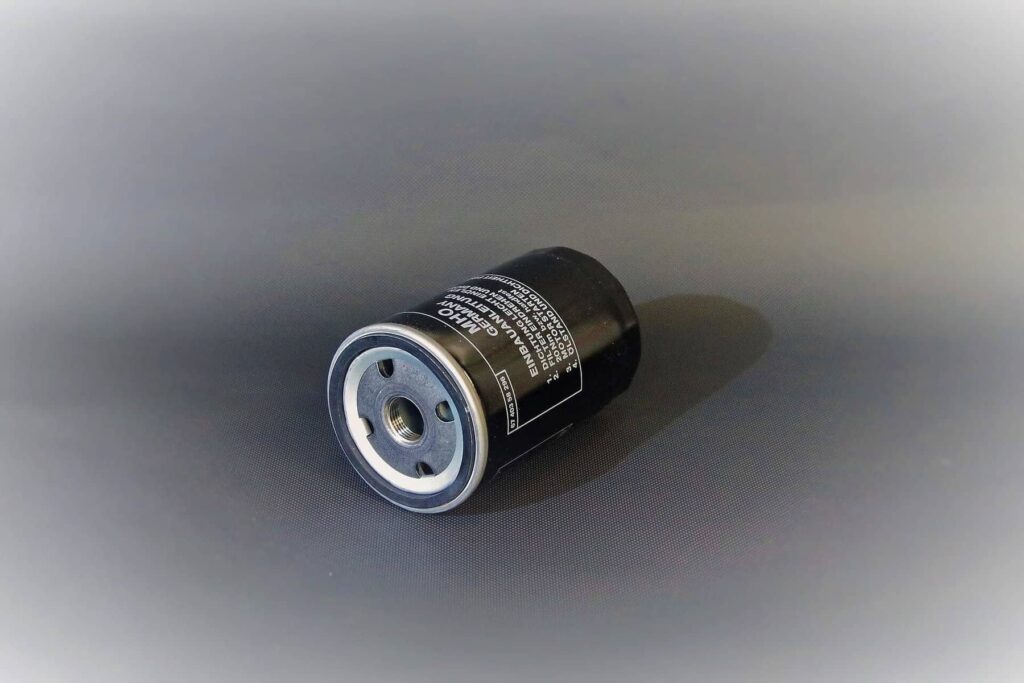
What to Do if Your Car Is Leaking Oil When Parked?
If you find a leak when the car is parked, start by monitoring the oil level. Keep the oil filled to the maximum level and recheck it daily. That way, you can be sure oil is leaking and not another similar color fluid.
Then, check the parts above in this article for oil leaks. Better yet, have a mechanic put the car on a ramp and take a look underneath. If it is a minor oil leak, the first place to check is usually the sump pan gasket; you will usually find the motor above the seal dry and then spot the wet areas where the sump pan seals to the engine block.
Can You Drive With an Oil Leak?
When a car leaks oil when parked, it usually has a very slow oil leak, which means you can drive. You can still drive in this scenario, but it’s important to check the oil level before you do to ensure it’s correct. Additionally, keep an eye on the temperature and oil pressure gauge, and be prepared to stop driving if they indicate any abnormalities or if the check engine light illuminates. If any of these warning signs appear, you should pull over immediately since it’s unsafe to continue driving.
If the oil leak is severe, i.e., you are topping it up before you drive by a considerable amount, do not drive and seek immediate repair. Driving with low oil levels can cause damage to the internal parts of the engine and lead to dangerous situations, such as engine failure while driving.
How to Prevent Oil Leaks
To prevent oil leaks, it is best to follow a proper vehicle maintenance schedule. Changing the oil every six months is recommended to eliminate any possibility of leaks arising from old and worn sump plug washers or the oil filter.
There are engine-stop leak oil additives which can help prevent minor leaks. These additives soften and swell the rubber seals, effectively sealing minor oil leaks. However, it is important to note that they only work on certain types of oil leaks and may not be effective in all cases.
Frequently Asked Questions
Should I Worry About A Small Oil Leak?
While a small oil leak may not be an immediate cause for concern, it should still be addressed sooner rather than later. A small leak can quickly turn into a bigger one, causing a significant loss of oil, which can lead to engine failure.
How Do I Find Out Where My Oil Leak Is Coming From?
To find where the oil leaks from, jack up the vehicle, support it on axle stands, and physically look under the engine for apparent signs of dripping oil or stain marks. Trace the drips or marks back to where the leak started. You may need to clean away the oil and check again later to be sure which part is leaking.
Bottom Line
If you notice an oil puddle under your car after it has been parked overnight, the most likely culprit is a weak sump gasket. However, before jumping to conclusions, it’s essential to ensure that the fluid is indeed oil and not one of the other fluids, such as wiper fluid, coolant, transmission fluid, or even brake fluid, which can have a similar appearance when splattered on the floor. If you do find a minor oil leak, there’s no need to panic, as most cars experience them. It’s important to know that not all leaks are the same, and those detected when the vehicle is parked are usually simple to repair once diagnosed.
